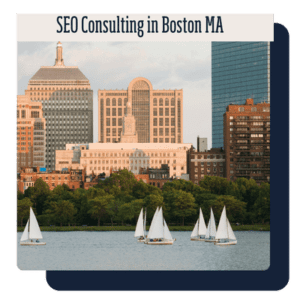There are so many great SEO consultants in Boston – but the Best SEO Company in Boston will not be the same for everyone. If you are looking for SEO help for a large corporation of 1,000 or more employees, you will need a full team and will likely need to hire an SEO consultant as a company employee. If you have 1,000 or fewer, here are the top considerations when hiring a digital marketing agency in Boston for SEO services.
Hiring An SEO Consultant

- Experience and Expertise
- Look for a consultant with a proven track record in SEO.
- Check their portfolio and case studies for past successes.
- Local Knowledge
- Ensure they understand the Boston market and local SEO strategies.
- Familiarity with local businesses and competition can be a significant advantage.
- Customized Strategy
- The consultant should offer a tailored approach specific to your business needs.
- Avoid one-size-fits-all solutions.
- Technical Skills
- Proficiency in on-page and off-page SEO techniques.
- Knowledge of the latest SEO tools and software.
- Content Strategy
- Ability to develop a content plan that aligns with your business goals.
- Expertise in keyword research, content creation, and optimization.
- Analytical Skills
- Proficient in using analytics tools like Google Analytics, SEMrush, and Moz.
- Ability to track and measure the effectiveness of SEO campaigns.
- Transparency and Communication
- Regular updates and clear communication regarding progress and results.
- Open to answering questions and providing detailed reports.
- White Hat Practices
- Adherence to ethical SEO practices and avoidance of black hat techniques.
- Ensures long-term results without risking penalties from search engines.
- Client Testimonials and Reviews
- Positive feedback and reviews from previous clients.
- Look for testimonials on their website or third-party review sites.
- Pricing and ROI
- Transparent pricing structure with a clear understanding of the services included.
- Focus on delivering a return on investment (ROI) rather than just rankings.
- Industry Knowledge
- Up-to-date with the latest SEO trends and algorithm changes.
- Participation in SEO communities and ongoing education.
- Comprehensive Services
- Ability to handle all aspects of SEO, including technical SEO, local SEO, link building, and content marketing.
- Offering complementary services such as web design, social media marketing, and PPC can be a bonus.
- Contract Terms
- Clear terms regarding contract length, deliverables, and exit clauses.
- Flexibility to adapt to your changing needs.
- Proven Methodology
- A well-defined process for implementing and adjusting SEO strategies.
- Examples of how they have successfully improved search rankings for other clients.
- References and Case Studies
- Willingness to provide references and detailed case studies.
- Opportunity to speak with past clients to gauge satisfaction.
How To Choose The Right SEO Consultant
What are the key performance indicators (KPIs) your SEO Consultant should use?
- Organic Traffic
- The number of visitors arriving at your website through unpaid search results.
- Keyword Rankings
- The positions of targeted keywords in search engine results pages (SERPs).
- Conversion Rate
- The percentage of visitors who complete a desired action (e.g., making a purchase, filling out a form).
- Bounce Rate
- The percentage of visitors who leave your website after viewing only one page.
- Pages Per Session
- The average number of pages viewed during a single session by a user.
- Average Session Duration
- The average amount of time a visitor spends on your website during a session.
- Click-Through Rate (CTR)
- The ratio of users who click on a specific link to the number of total users who view a page, email, or advertisement.
- Backlinks
- The number and quality of inbound links pointing to your website.
- Domain Authority (DA) / Page Authority (PA)
- Metrics developed by Moz to predict how well a website will rank on search engines.
- New vs. Returning Visitors
- The proportion of new visitors compared to returning visitors.
- Cost Per Acquisition (CPA)
- The cost associated with acquiring a new customer through organic search.
- Organic Clicks
- The number of clicks received from organic search results.
- Impressions
- The number of times your website appears in search results.
- Local SEO Metrics
- Metrics such as local search rankings, Google My Business (GMB) views, and local citations, crucial for businesses targeting a local audience.
- Technical SEO Metrics
- Site speed, mobile usability, crawl errors, and indexation status.
- Content Engagement
- Metrics such as time on page, social shares, and comments on blog posts.
- Goal Completions
- Tracking specific goals set up in Google Analytics, such as form submissions, downloads, or other key actions.
- Revenue from Organic Traffic
- The amount of revenue generated from visitors who arrived through organic search.
- Search Visibility
- A measure of how often your website appears in search results for relevant queries.
- Core Web Vitals
- Metrics related to user experience such as loading performance (Largest Contentful Paint), interactivity (First Input Delay), and visual stability (Cumulative Layout Shift).
What is your approach to link building?
Use of white hat backlinks only should be used. White hat backlinks include blogs, press releases, social posts etc that have valuable content.
Boston Digital Marketing has helped three local Boston-based companies get listed in the INC5000 as the “Fastest Growing Companies” in America. We are your qualified SEO consultant in Boston who can help improve your online presence and drive traffic to your website. Our SEO expertise is not based around paid ads – we rely on organic search and web automation that continues to improve over time.